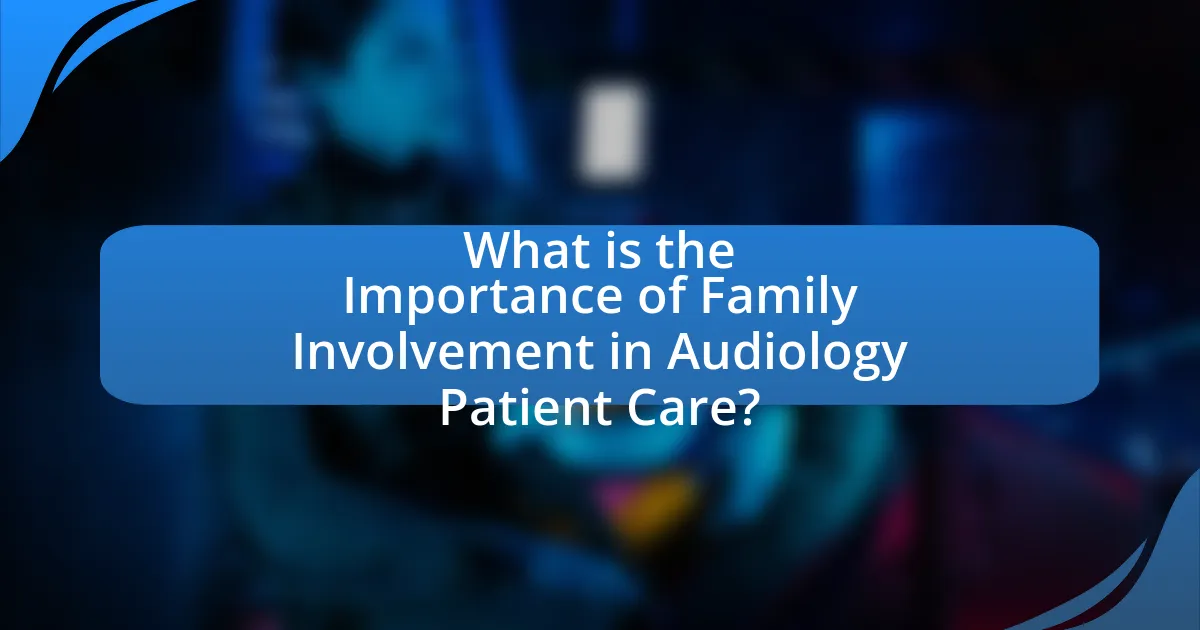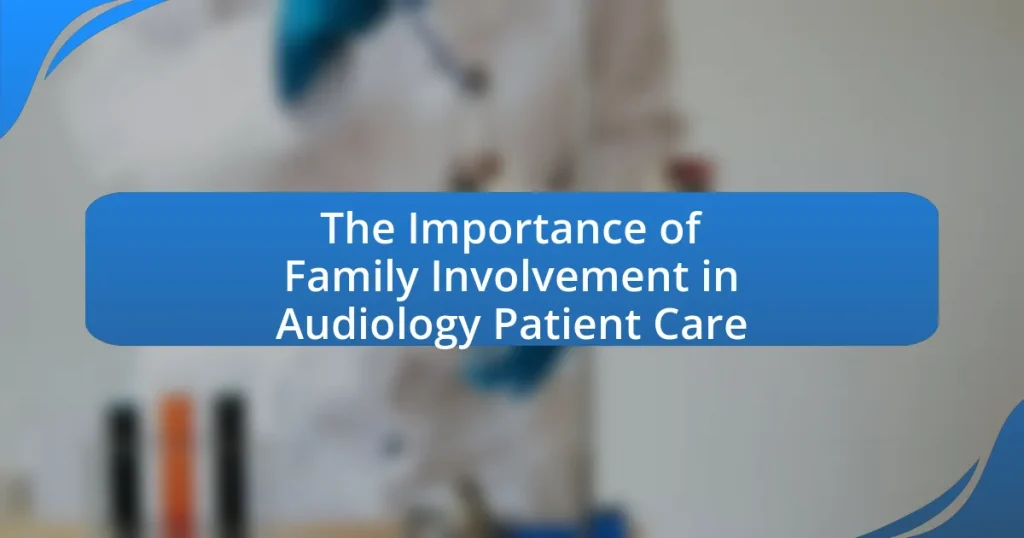Family involvement in audiology patient care is essential for enhancing communication, support, and adherence to treatment plans. Engaging family members leads to improved patient outcomes, including better hearing aid usage and overall satisfaction with care. Research highlights that family support not only facilitates tailored interventions but also reduces the emotional impact of hearing loss, fostering a positive environment for patients. The article explores the critical role of family dynamics in audiological care, the barriers to effective communication without family involvement, and strategies for encouraging family participation to optimize patient rehabilitation and emotional well-being.

What is the Importance of Family Involvement in Audiology Patient Care?
Family involvement in audiology patient care is crucial as it enhances communication, support, and adherence to treatment plans. Engaging family members helps patients feel more comfortable and understood, which can lead to better outcomes in hearing rehabilitation. Research indicates that patients with supportive family involvement are more likely to follow through with audiological recommendations, resulting in improved hearing aid usage and overall satisfaction with care. Studies show that family members can provide essential insights into the patient’s daily challenges, facilitating tailored interventions that address specific needs.
Why is family involvement crucial in audiology?
Family involvement is crucial in audiology because it enhances patient outcomes and supports effective communication. Engaging family members in the audiological process helps ensure that patients receive consistent support, which is vital for successful hearing rehabilitation. Research indicates that when families are actively involved, patients are more likely to adhere to treatment plans, leading to improved hearing aid usage and better overall satisfaction with care. Additionally, studies show that family support can significantly reduce the emotional and psychological impact of hearing loss, fostering a more positive environment for the patient.
How does family support impact patient outcomes in audiology?
Family support significantly enhances patient outcomes in audiology by improving adherence to treatment and facilitating better communication. Research indicates that patients with strong family involvement are more likely to follow through with audiological recommendations, such as using hearing aids consistently. A study published in the Journal of the American Academy of Audiology found that patients who received support from family members reported higher satisfaction with their hearing devices and demonstrated improved auditory performance. This correlation underscores the critical role that family dynamics play in the overall effectiveness of audiological care.
What role does family play in the audiology treatment process?
Family plays a crucial role in the audiology treatment process by providing emotional support, facilitating communication, and assisting with the implementation of treatment plans. Their involvement can enhance patient motivation and adherence to audiological recommendations, which is essential for successful outcomes. Research indicates that patients with family support are more likely to engage in follow-up appointments and utilize hearing aids effectively, leading to improved quality of life. For instance, a study published in the Journal of the American Academy of Audiology found that family involvement significantly correlates with better patient satisfaction and treatment adherence.
How does family involvement enhance communication in audiology?
Family involvement enhances communication in audiology by fostering a supportive environment that encourages open dialogue between patients and audiologists. When family members participate in audiology appointments, they can provide valuable insights into the patient’s hearing challenges and preferences, which aids audiologists in tailoring treatment plans effectively. Research indicates that patients with family support are more likely to adhere to hearing aid usage and follow-up appointments, leading to improved outcomes. A study published in the Journal of the American Academy of Audiology found that family engagement significantly increased patient satisfaction and communication effectiveness, demonstrating the critical role families play in the audiological care process.
What are the barriers to effective communication without family involvement?
Barriers to effective communication without family involvement include a lack of emotional support, limited understanding of medical information, and decreased motivation for patient engagement. Emotional support from family members can enhance a patient’s willingness to communicate openly with healthcare providers, as studies show that patients who feel supported are more likely to express their concerns and preferences. Additionally, family members often help interpret complex medical terminology, which can be challenging for patients to understand on their own; research indicates that patients with family involvement have better comprehension of their health conditions. Lastly, without family encouragement, patients may feel less motivated to participate actively in their care, leading to poorer health outcomes.
How can families facilitate better communication between patients and audiologists?
Families can facilitate better communication between patients and audiologists by actively participating in appointments and ensuring that patients express their concerns and preferences. This involvement allows families to help clarify the patient’s needs, which can lead to more tailored audiological care. Research indicates that family support significantly enhances patient outcomes in healthcare settings, as it fosters an environment where patients feel more comfortable discussing their issues. For instance, a study published in the Journal of the American Academy of Audiology found that patients who had family members present during consultations reported higher satisfaction and better understanding of their audiological conditions.
What are the emotional benefits of family involvement in audiology care?
Family involvement in audiology care significantly enhances emotional well-being for patients. This involvement fosters a sense of support and belonging, which can alleviate feelings of isolation often experienced by individuals with hearing loss. Research indicates that patients who engage their families in the audiology process report lower levels of anxiety and depression, as family members provide encouragement and understanding during treatment. Additionally, family participation can improve communication skills and coping strategies, leading to increased confidence in social interactions. Studies show that when families are actively involved, patients are more likely to adhere to treatment plans, further contributing to positive emotional outcomes.
How does family support affect the emotional well-being of audiology patients?
Family support significantly enhances the emotional well-being of audiology patients by providing a sense of belonging and reducing feelings of isolation. Studies indicate that patients with strong family involvement experience lower levels of anxiety and depression, which are common among individuals with hearing loss. For instance, research published in the Journal of the American Academy of Audiology found that emotional support from family members correlates with improved coping strategies and overall mental health outcomes for audiology patients. This support can manifest through encouragement, active listening, and participation in treatment decisions, all of which contribute to a more positive emotional state and better adherence to audiological care.
What strategies can families use to provide emotional support during audiology treatment?
Families can provide emotional support during audiology treatment by actively participating in the patient’s care, fostering open communication, and creating a supportive environment. Active participation includes attending appointments, asking questions, and understanding the treatment process, which helps the patient feel less isolated. Open communication allows family members to express their feelings and concerns, encouraging the patient to share their experiences and emotions. Creating a supportive environment involves offering reassurance, celebrating small victories, and being patient with the challenges faced during treatment. Research indicates that emotional support from family significantly enhances treatment outcomes and patient satisfaction, as noted in studies highlighting the correlation between family involvement and improved psychological well-being in patients undergoing audiology care.
How can family involvement be encouraged in audiology settings?
Family involvement in audiology settings can be encouraged through structured communication and education initiatives. Audiologists can implement family-centered care practices, which include actively involving family members in assessments, treatment planning, and follow-up sessions. Research indicates that when families are educated about hearing loss and its management, they are more likely to participate in the care process, leading to improved patient outcomes. For instance, a study published in the “Journal of the American Academy of Audiology” found that family engagement significantly enhances adherence to treatment plans and overall satisfaction with care.
What challenges do families face in participating in audiology care?
Families face several challenges in participating in audiology care, including financial constraints, lack of awareness, and logistical issues. Financial constraints often arise from the high costs associated with hearing aids and audiology services, which can deter families from seeking necessary care. Lack of awareness about the importance of early intervention and available resources can lead to delays in treatment, as families may not recognize the signs of hearing loss or understand the benefits of audiology services. Logistical issues, such as transportation difficulties and scheduling conflicts, further complicate access to care, making it harder for families to attend appointments consistently. These challenges collectively hinder effective family involvement in audiology patient care.
What specific strategies can families employ to support audiology patients?
Families can employ specific strategies such as active listening, creating a supportive communication environment, and participating in audiology appointments to support audiology patients. Active listening involves giving full attention to the audiology patient, ensuring they feel heard and understood, which can enhance their confidence in expressing their needs. Creating a supportive communication environment includes minimizing background noise and using clear speech, which aids in better understanding for patients with hearing difficulties. Additionally, participating in audiology appointments allows family members to gain insights into the patient’s hearing challenges and treatment options, fostering a collaborative approach to care. These strategies are essential as research indicates that family involvement significantly improves patient outcomes in audiology, enhancing both emotional support and adherence to treatment plans.
How can families assist in the rehabilitation process for audiology patients?
Families can assist in the rehabilitation process for audiology patients by providing emotional support, facilitating communication, and participating in therapy sessions. Emotional support helps patients cope with the challenges of hearing loss, which can improve their motivation and engagement in rehabilitation. Facilitating communication involves actively participating in conversations, using clear speech, and employing visual cues, which enhances the patient’s understanding and confidence. Additionally, family members can attend therapy sessions, reinforcing techniques learned and ensuring consistent practice at home. Research indicates that family involvement significantly improves outcomes in audiology rehabilitation, as patients with supportive family networks often show better adherence to treatment plans and greater overall satisfaction with their hearing aids or cochlear implants.
What resources are available for families to better understand audiology care?
Families can access various resources to better understand audiology care, including educational websites, support groups, and informational brochures. Websites such as the American Speech-Language-Hearing Association (ASHA) provide comprehensive information on hearing disorders, treatment options, and the role of audiologists. Support groups, both online and in-person, offer families the opportunity to connect with others facing similar challenges, facilitating shared experiences and knowledge. Additionally, brochures from audiology clinics often summarize key concepts in audiology care, making complex information more accessible. These resources collectively enhance families’ understanding and involvement in the audiology care process.
What are the best practices for integrating family involvement in audiology patient care?
The best practices for integrating family involvement in audiology patient care include actively engaging family members in the assessment and treatment process, providing education about hearing loss and its management, and encouraging open communication between audiologists and families. Engaging family members helps to create a supportive environment that enhances patient outcomes, as studies show that family involvement can lead to improved adherence to treatment plans and better overall satisfaction with care. Additionally, providing educational resources tailored to family needs ensures they understand the patient’s condition and can participate effectively in decision-making. Open communication fosters trust and collaboration, which are essential for successful audiological care.


